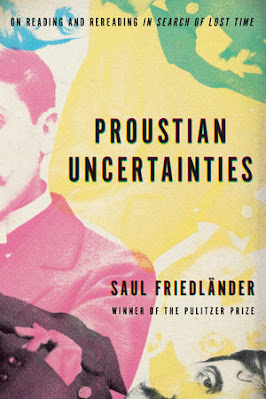Proustian Uncertainties: On Reading and Rereading In Search of Lost Time by Saul Friedländer - 2020
Proustian Uncertaiainties: On Reading and Rereading In Search of Lost Time by Saul Friedländer is book that anyone who has read and seen the greatness of Marcel Proust’s in Search of Lost Time will find fascinating. The author is attempting to understand the relationship between the narrator of the work and Proust himself. It is also an exploration of the challenges of just keeping as much of this giant work in your consciousness as you can.
From his concluding remarks you can sense and for most readers identify with the concerns of Friedläder:
“Each of us, In Search readers, returns to some haunting episodes again and again, and for each of us they may be different. But at some stage we all have to make an effort to remember that it’s not Proust’s story that we follow but that of his Narrator. And yet we sense that as we are enthralled by the unfolding of that life’s description, we recognize a deep layer of authenticity. We can even identify what the author doesn’t want to tell us, or, some other time, what he doesn’t want to tell but hopes that some readers will uncover. It is on that search of the Search that this essay is based. Of course, many questions raised in our text have remained unanswered, but hopefully at least a few may have received some further emphasis.”
There are three central issues explored in looking at the relationship of the Narrator’s self presentation and what Friedländer tells us of the life of Proust. Friedländer draws on numerous French and English sources but he does draw heavily from Wayne C. Carter’s biography. Here is an important quote
“William C. Carter’s more recent biography offers a very nuanced assessment of the proximity between author and Narrator: “In his letters and notes to himself about the novel, Proust usually spoke of the Narrator as ‘I,’ making no distinction between engaged not in writing his autobiography but in creating a novel in which there are strong autobiographical elements. The symbiosis between Proust and his Narrator can be explained by the hybrid origin of the story. Having begun as an essay in which the ‘I’ was himself, as the text veered more and more toward fiction, the ‘I’ telling the story became both its generator and its subject, like a Siamese twin, intimately linked to Proust’s body and soul and yet other” (Carter, Marcel Proust: A Life, 474). Further on in the biography, Carter adds an important comment: “As Proust lived more and more in the world he invented, he came to embody the Narrator rather than the other way around”
There are three central themes explored. One is the relationship of the Narrator to his mother as this reflects and differs from Proust’s relationship to his own mother. Friedländer insightfully talks about the Narrator’s longing for a goodnight kiss from his mother. We are given sufficient biographical data to sharpen our focus.
Proust never in his own life hid his homosexuality. The Narrator is not a homosexual. There are several female romantic interests that take up a lot of space in the novel. There is a lesbian relationship and a prominent gay character. Friedländer speculates that Proust might have thought that if the narrator identifies as Gay censors and conservative readers might be displeased. I am not, for what it worth, convinced fully of this but a number of interesting questions are raised.
A big open question for Friedländer is the question of Jewish identity of the Narrator versus Proust himself. There are anti-Semitic characters in the novel, Friedländer talks about the Dreyfus question in the novel and in the Paris of Proust.
Proustian Uncertainties: On Reading and Rereading In Search of Lost Time by Saul Friedländer added to my understanding of the novel and of
Proust. I think anyone who has read the novel, especially rereaders, will have wondered what forces shaped the work and the author.
SAUL FRIEDLÄNDER is an award-winning Israeli-American historian and currently a professor of history (emeritus) at UCLA. He was born in Prague to a family of German-speaking Jews, grew up in France, and lived in hiding during the German occupation of 1940–1944. His historical works have received great praise and recognition, including the 2008 Pulitzer Prize for General Non-Fiction for his book The Years of Extermination: Nazi Germany and the Jews, 1939–1945.
From the publisher’s website - Other Press
“[A] haunting work…Friedländer has always imbued his scholarship with an acute literary sensibility…incisive and quizzical…[an] intimate and subtle book.” —Wall Street Journal
“[A] superb new book…Friedländer, the great historian of Nazi Germany and the Jews and also the author of his own Proustian memoir, When Memory Comes, argues that Proust’s narrator is a ‘disembodied presence unlike that in any novel before,’ and that it’s the relation of that presence to Proust himself that makes the Recherche, with its biting social satire, so unique.” —Times Literary Supplement, Books of the Year
“The pleasure of [Proustian Uncertainties] comes from…the author unspooling thoughts and venturing theories collected over many years about a book he clearly loves…By taking a bird’s-eye view of the novel, Friedländer notices continuities and contradictions that are hard to see from within the teeming thickets of Proust’s prose.” —Harper’s
“[An] excellent volume about In Search of Lost Time and Proust himself.” —Literary Hub
https://otherpress.com/product/proustian-uncertainties-9781590519110/reviews/#content
Mel u
The Reading Life












